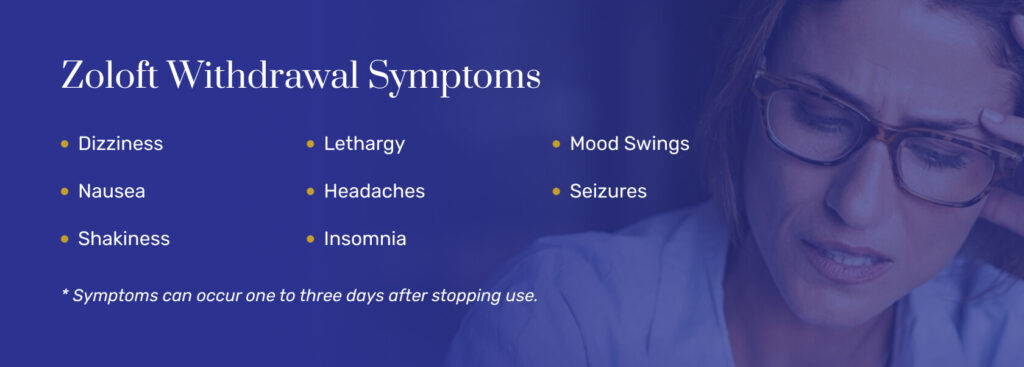As a result, Zoloft (sertraline) comes with the risk of experiencing withdrawal symptoms when discontinuing use. Withdrawal symptoms from Zoloft include dizziness, nausea, shakiness, and lethargy, among others. A tapered approach to withdrawal is generally recommended.
Zoloft Uses
Zoloft is in a class of drugs called SSRIs (selective serotonin reuptake inhibitors). The medication increases serotonin levels in the brain, helping to treat depression. Serotonin is associated with mood and sleep regulation, as well as feelings of wellness and well-being.
Are you or someone you know struggling with addiction?
I may have a problem I am concerned for a loved oneAs a result, the brain can become dependent on Zoloft. This dependence can be compounded when the medication is taken outside of prescribed guidelines.
Zoloft withdrawal occurs when the drug is stopped suddenly, as the body and brain readjust to normal everyday activity. Withdrawal length can vary depending on the individual and how long they have taken Zoloft.
What Causes Withdrawal From Zoloft?
Zoloft withdrawal can result in undesirable and uncomfortable symptoms that occur largely because of chemical changes that occur in the brain when quitting the drug.
As the body adjusts to changes that have been caused by taking Zoloft as well as readjustment to normal activity, there is an imbalance that can have unwanted effects both physically and mentally.

Common Zoloft Withdrawal Symptoms
Considering that Zoloft has a shorter half-life than many other prescription drugs (approximately 24 hours), Zoloft only has a low to moderate risk of causing withdrawal symptoms when discontinuing use.
It is not recommended for individuals who have abused Zoloft for a prolonged period of time to quit use suddenly.
Zoloft withdrawal symptoms can start to set in around one to three days after stopping use. Withdrawal symptoms may include the following:
Nausea
Vomiting
Dizziness
Depression
Mood swings
Excessive sweating
Shakiness
Headaches
Lethargy
Insomnia
Hallucinations
Seizures
Factors Related to Withdrawal Symptoms
There are multiple factors that can determine whether or not someone will experience Zoloft withdrawal as well as symptom duration and intensity.
Withdrawal severity is influenced by the length of time someone has been taking Zoloft as well as the average dosage. With higher doses and longer duration of use, severe and prolonged withdrawal is more likely.
A person’s physiology influences the withdrawal process. Factors that come into play include the following:
Age
Body size
Diet
Hydration levels
Mental health conditions
Since Zoloft is generally prescribed to treat depression, people may experience a resurgence of depressive symptoms during withdrawal. This is sometimes referenced as antidepressant discontinuation syndrome. Mental health care is essential during this time to ensure depression is properly managed.
How Long Does Withdrawal Last?
Antidepressant withdrawal symptoms can last anywhere from a few days to multiple weeks when it comes to Zoloft.
Many individuals will make a full recovery within a few weeks. However, individuals who have used Zoloft outside of prescribed guidelines and are more susceptible to withdrawal symptoms might experience discomfort that can last for months or even years. This is generally referred to as protracted withdrawal.
Zoloft Withdrawal Timeline
Zoloft discontinuation symptoms tend to set in within a few days. Early symptoms may include nausea, vomiting, shaking, sweating, and insomnia.
Here is a timeline of what to expect:
24 to 48 Hours
If you stop Zoloft abruptly, you may begin to experience withdrawal symptoms within 24 to 48 hours. At first, you may experience flu-like conditions, along with some dizziness and nausea. You might also feel imbalanced.
After 1 Week
The most severe symptoms related to Zoloft withdrawal will generally be experienced within one to two weeks. Body aches will be common during this time, as well as depression and insomnia. You may also feel like your emotional responses are heightened, and you might feel more anxious or irritable.
Drug cravings may also begin to set in if they haven’t already. These symptoms may be intense at first, but they should ease up the longer you’re off the medication.
3 Weeks to a Month
For many individuals, withdrawal symptoms tend to subside within two to three weeks. When quitting sertraline, withdrawal symptoms may last for longer.
Some individuals may experience certain withdrawal symptoms, such as depression, anxiety, and drug cravings, for months or even years after discontinuing use. This is known as post-acute withdrawal syndrome (PAWS).
Zoloft Tapering Guidelines
It’s always best to consult your doctor before beginning any kind of Zoloft tapering protocol. They know your body and your health history best, and they can work with you to develop a withdrawal process that will be safe and secure.
The FDA recommends gradually tapering your Zoloft dose instead of stopping suddenly and going cold turkey. Your doctor can gradually reduce your dosage until you’re not taking the medication anymore. For instance, if you’re taking an upper level of Zoloft (200 mg), then you may taper down slowly, reducing your dosage by 50mg in each increment until you’re at 0mg.
There isn’t a one-size-fits-all approach when it comes to tapering off Zoloft. One person might be able to taper in just a few days, while someone else might need a few weeks or even a few months to withdraw safely. The amount of time you need will depend on several factors including your body composition, the amount of Zoloft you were taking, and how long you’ve been on the medication.
While you’re tapering your dose, remember to take care of yourself. Exercise lightly, eat nutritious foods, and be sure to get plenty of rest. You can also participate in psychotherapy to help manage any feelings of anxiety or depression you might experience as you wean off the medication.
How to Safely Detox From Zoloft
It is not recommended for individuals who have abused Zoloft for a prolonged period of time to quit use suddenly. Intense withdrawal issues can occur. If an individual stops cold turkey at home, medical intervention may be necessary due to severe withdrawal symptoms.
Medical professionals recommend tapering off antidepressants like Zoloft. This entails weaning the individual off the drug over a period of time rather than quitting cold turkey.
Medically assisted detox provides a variety of benefits. A doctor will be able to observe the process and treat any symptoms or situations that arise accordingly. Medications may be prescribed that make the process easier without compromising the detox protocol.
Seek medical assistance before attempting Zoloft detox. This ensures you’ll stay safe and successfully make it through withdrawal without relapse.
Professional Treatment Options for Sertraline Withdrawal
Seek medical assistance before attempting Zoloft detox. This ensures you’ll stay safe and successfully make it through withdrawal without relapse. At Boca Recovery Centers, we welcome you to detox safely and comfortably at one of our premium rehab facilities. We offer medical detox, inpatient/residential rehab, and three levels of outpatient care.
Zoloft withdrawal is a very personal experience and will be different for everyone. You’re more likely to experience adverse symptoms if you quit the drug all of a sudden. This can lead to SSRI withdrawal syndrome, which can trigger an intense physical and emotional response.
Most people feel symptoms for around one to two weeks, though they could persist longer. They typically peak in the first five days, and gradually subside.
Yes. It is dangerous to quit Zoloft suddenly instead of tapering your dosage gradually. Doing so could make you more likely to experience uncomfortable withdrawal symptoms, which can range from nausea and dizziness to hallucinations and seizures.
It’s best to detox from Zoloft under the guidance and supervision of a medical professional. This process is known as medical detox.
Detoxing at a dedicated rehab facility is safer and more comfortable. You’ll have the chance to live in a cozy, home-like space surrounded by people who are on the same journey as you, and under the watchful care of a team of physicians. You can also continue your treatment after the initial detox period is over, choosing to stay for inpatient or outpatient services through the same provider.
We also provide robust aftercare services and community connections to help you achieve long-term recovery. Contact our admissions team to learn more about our intake process and take that first step today.
- Sertraline. (May 2022). StatPearls.
- A Comparative Study on Safety and Efficacy of Desvenlafaxine Versus Sertraline in Depression. (February 2022). Cureus.
- A Focus on Abuse/Misuse and Withdrawal Issues With Selective Serotonin Reuptake Inhibitors (SSRIs): Analysis of Both the European EMA and the US FAERS Pharmacovigilance Databases. (May 2022). Pharmaceuticals.
- Recognition and Management of Antidepressant Discontinuation Syndrome. (July 2017). Journal of Psychiatry & Neuroscience.
- Antidepressant Discontinuation Syndrome. (May 2017). CMAJ.
- Estimating Risk of Antidepressant Withdrawal From a Review of Published Data. (December 2022). CNS Drugs.











